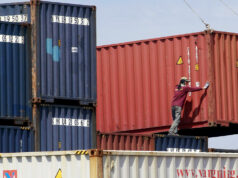Senate to retain ‘50%-70%’ of DoF tax package
THE SENATE is planning floor deliberations on Sept. 20 on new revenue measures that will partly compensate for dilutions of the original tax reform program proposed by the Department of Finance (DoF).
Senate ways and means committee chair Senator Juan Edgardo M. Angara said the chamber aims to retain about 50% to 70% of the DoF’s Tax Reform for Acceleration and Inclusion Act, but maintained the revenue outcome will be unchanged.
“More or less it’s maybe 50 to 60 or 70% of what the DoF proposed,” he told the media after the tax reform’s synthesis hearing yesterday.
Changes include the lowering of the sugar-sweetened beverage excise tax to P5 per liter from P10 initially, the phasing of the P6 excise tax on petroleum, as well as the bracket structure for the automobile excise tax.
“I think we will stick to the three-year structure that the house proposed, its just the distribution of the P6,” he said.
The value-added tax exemptions on the sale of socialized housing and on renewable energy will likewise be retained — adding to the list of those sectors keeping their exemptions in the House version, such as sales booked by cooperatives and purchases by senior citizens and persons with disabilities.
Mr. Angara has not provided final details on the changes, noting that the chamber is still working on it.
He said that the committee is still waiting for the comments of all Senators before a final committee report emerges.
However, despite these modifications, the Senator said that he expects around P130 billion in additional revenue for the first year of the tax reform’s implementation.
“It’s about the same, P130 (billion),” said Mr. Angara.
The projected outcome is due to measures like a higher tax on interest income on foreign currency deposits, higher taxes on dividend income, an excise tax on cosmetics, and levies on plastic bags.
The committee’s projected revenue is slightly lower than that of the House-approved version, House Bill No. 5636, which is expected to generate P133.8 billion, also significantly lower than the Finance department’s original P157.2 billion version.
Despite forwarding these measures to make up for the losses, Mr. Angara said that it still has to be further studied. There are still no hard figures for the newly proposed duties.
“I think we also need to balance the effects, the equity effects of the proposed tax package.”
“Clearly, the plastic bag levy needs to be studied further in view of what the [Trade department] said. They are still constructing a road map so maybe we can hold off on that, since even the DoF doesn’t know yet how to administer such a tax.”
“Cosmetics, we have to look at if there’s a way that we can separate the vanity procedures from the medical procedures if there is, then we want to tax one but not the other.”
Finance Undersecretary Karl Kendrick T. Chua said he welcomes the introduction of the new measures, but added that they have to undergo further study, not being part of the DoF’s original package.
“We welcome that they are considering it, but we need studies and consultation similar to what we did for package one. So we hope that we will put more priority on the original package one, because those measures are really well-studied,” he said.
“Basically we have to hear it and get more information. It’s too early, we have to do full homework,” added Mr. Chua.
Asked whether his team in the Finance department has revenue estimates for the new measures, he said: “These are very very preliminary estimates.”
Mr. Chua said he continues to hope for passage of the DoF’s version, and plans to urge legislators to strengthen the bill during the plenary deliberations as well as in the bicameral conference before the President approves it.
Mr. Chua said that the P133.8 billion revenue level has been programmed into the 2018 budget — which was approved on second reading — leaving the Senate little room to tweak the tax reform bill further.
“If they cut something, they have to find some alternative,” Mr. Chua said.
He also added that the government faces additional costs next year.
“There’s a free tuition that has to be funded, P50 billion… Marawi, P30 billion. So P134 plus P80 billion is more than P200 billion, so as much as possible we want them also to consider the bigger picture,” he said. — Elijah Joseph C. Tubayan



